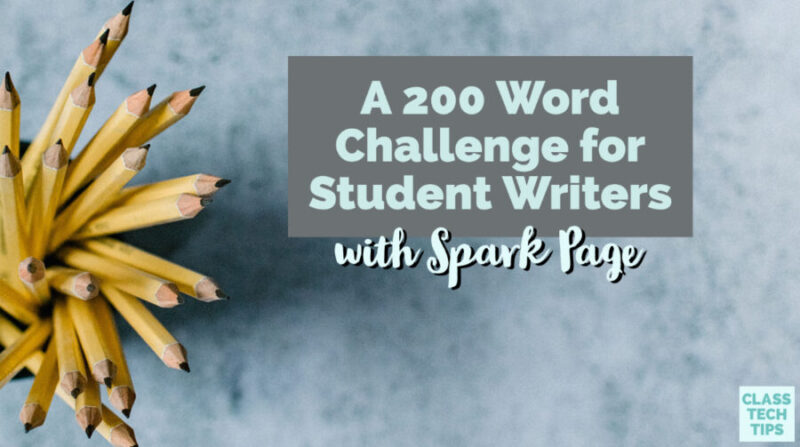

Share this post
A 200 word challenge for student writers.
- November 24, 2020
I’ve had the pleasure of working with this company. All opinions are my own.
Have you tried a writing challenge with your students? I was so excited to have an opportunity to participate in a special word challenge with my friends at Adobe Education . It’s called a “ 200 Word Challenge ” and it’s the perfect format for student writers. In this blog post, I’ll take you through the challenge resources, share a link to the video where I participate in the challenge, and hopefully inspire you to tailor this to your own classroom.
If you’re a regular reader of the blog, you know how much I love the Adobe Spark tools. Ben Forta and I even wrote a book called 40 Ways to Inject Creativity Into Your Classroom With Adobe Spark . This challenge isn’t one of our 40 activities, but I’m very excited to share it with you. And don’t forget, I do have a free download, it’s a set of graphic organizers you can use with the Spark tools.
Let’s jump into the writing challenge!
Challenge for Student Writers
The 200 word student writing challenge takes a spin on a traditional writing prompt. Instead of asking students to respond to one question, it has an overarching theme. The theme is broken down into four sub, or smaller, questions. Students can respond with their answers to the questions using about 50 words each.
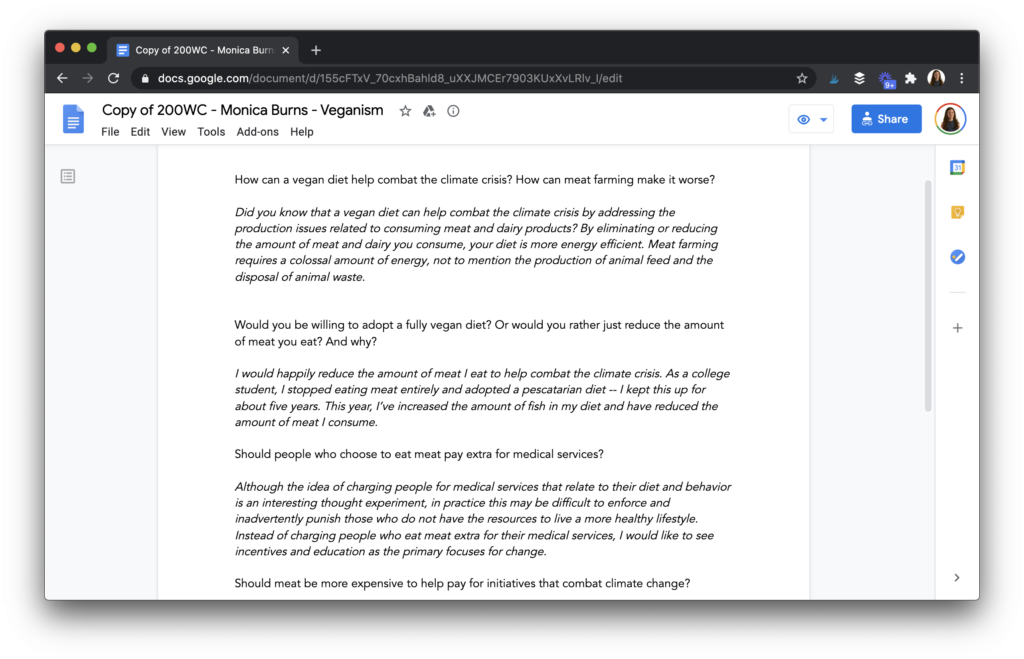
As you can see in the screenshot above, I answered the questions for my challenge on a Google document before jumping into Adobe Spark. Just like how you would create an example, or exemplar for your students, this is a great step to model. After students put in their responses to their questions, they may want to share with a partner for feedback.
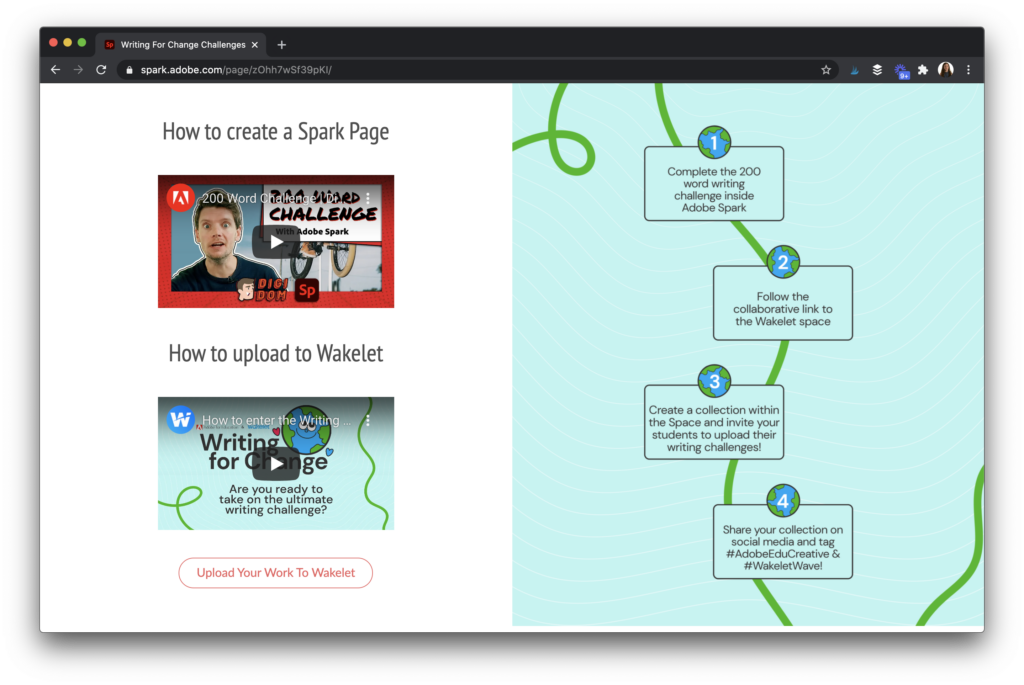
The challenge I’m sharing here in this blog post isn’t grade level specific. So it provides a great opportunity for you to examine your English Language Arts goals, or connect with an ELA teacher who may have certain skills they are working on with your students, if you are teaching a different subject area. You might decide to pull in a checklist, or rubric, or simply include this challenge alongside specific mini lessons already on your calendar.
Sharing Student Writing
After students have created their document with responses to the questions, it’s time to head over to Adobe Spark Page . Spark Page is the website creation tool that allows students to create beautiful landing pages. As you can see in the screenshot below, I am sharing examples from an Adobe Spark Page website in my Chrome Web browser. You can also use Adobe Spark Page on iOS ,. The app for iPads and iPhones is very user-friendly, and students can login with the same email they might use on a Web browser.

If you haven’t set up Adobe Spark for your school, you have two options. This page shares details on district level implementation as well as how teachers can set up their class if you are a G Suite school.
Once students have opened up their Spark Page, they can build out their website from top to bottom. At the top of the screen there’s a space to add a title and header image.
Then the plus sign that follows as students scroll down the page allows them to combine text, images, links, and more. To get an idea of what this project looks like in action, check out this video recording of my session with Tanya Avrith and Dominic Traynor. We go through the steps together for creating a Spark Page with my example for the challenge.
200 Word Challenge
Although you are welcome to come up with your own writing prompts and ideas, the team at Adobe Education and Wakelet have you covered. This page goes through lots of ideas for getting kids talking about big issues . As I mentioned above, you might only focus on specific goals you have for students in English Language Arts or integrate another content area.
I can’t wait to see what your students create! If you decide to share on social media, make sure to tag my account @classtechtips as well as @adobeforedu. You can also add the hashtags #AdobeEduCreative and #WakeletWave for this challenge. This way students can connect with other kids in different parts of the world!
Stay up-to-date on all things EdTech.
EdTech tips and resources for educators, straight from Monica’s desk every Monday. Don’t miss a thing.
Share this post:

Monica Burns
Dr. Monica Burns is a former classroom teacher, Author, Speaker, and Curriculum & EdTech Consultant. Visit her site ClassTechTips.com for more ideas on how to become a tech-savvy teacher.
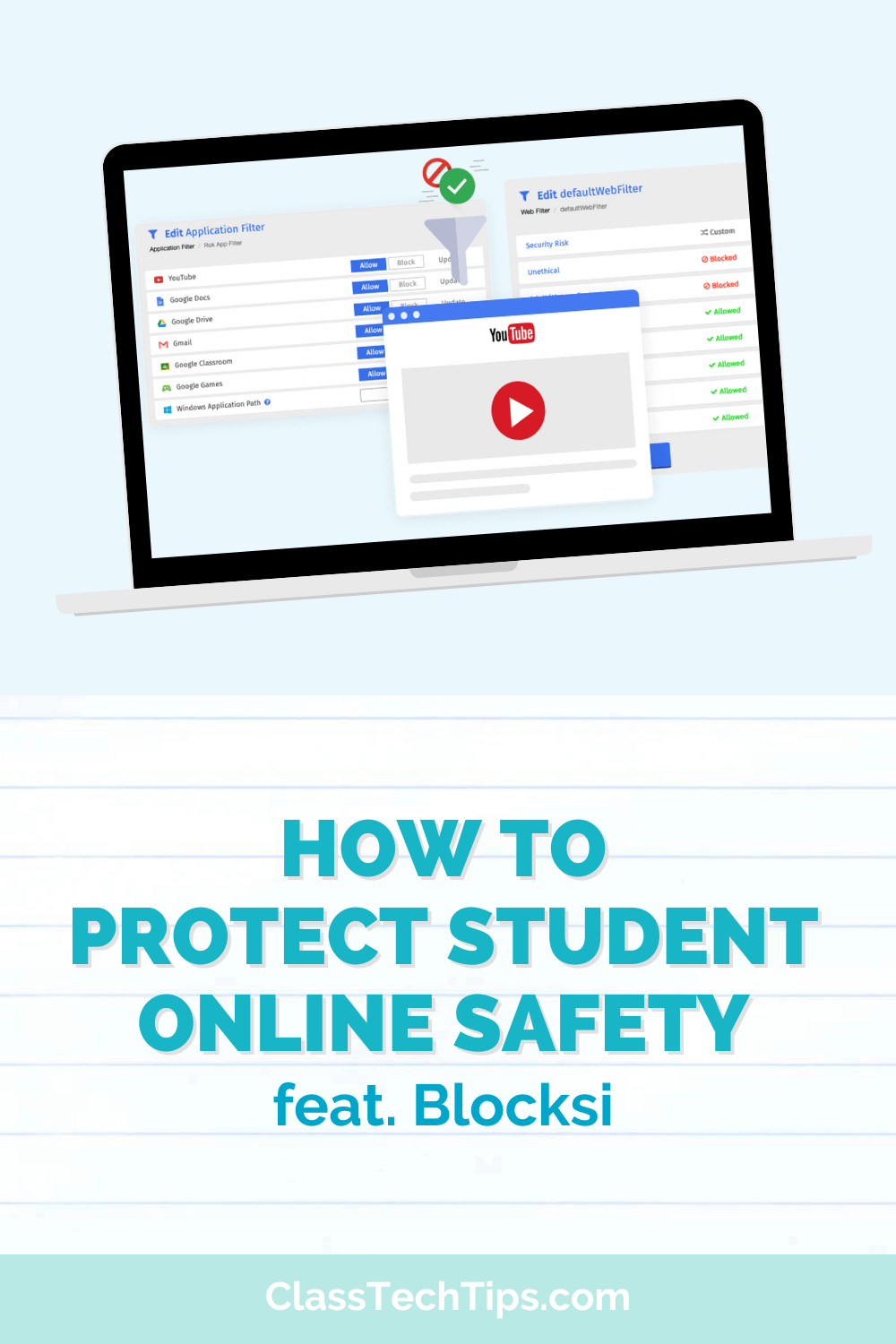
How to Protect Student Online Safety
Discover essential strategies to ensure student online safety with Blocksi—a must-read for educators dedicated to safe digital learning.

10 Summer Activities for Kids with a Techy Spin
Ignite summer learning with 10 summer activities for kids to explore, create, and grow while having tons of fun inside and out of school.

How a School Leader Can Use AI Tomorrow – Easy EdTech Podcast 265
Use AI tomorrow to save time as a school leader for emails, lesson planning support, and more. Get workflow tips and a free resource.
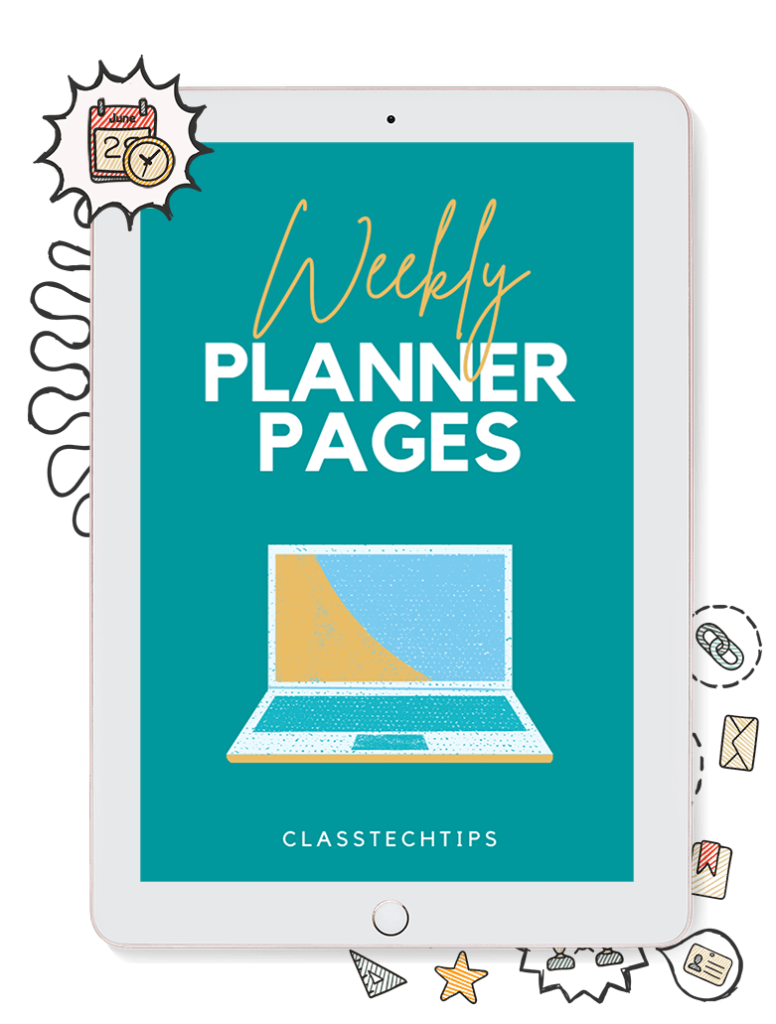
Start every week with a plan and stay organized this school year!
- You'll get a standard daily planner template, weekday, and weekend templates
- A monthly at-a-glance calendar and a monthly goal setting sheet
- A few extra pages for notes, contacts and passwords
Free summer Checklist

5 Things to Do Now to Make Tech Easier in the New School Year
- Try these five tips now and save time when you head back to school this fall.
- This quick list gives you FIVE action items to make your technology integration easier this school year.
- Save time this school year with a special EdTech checklist
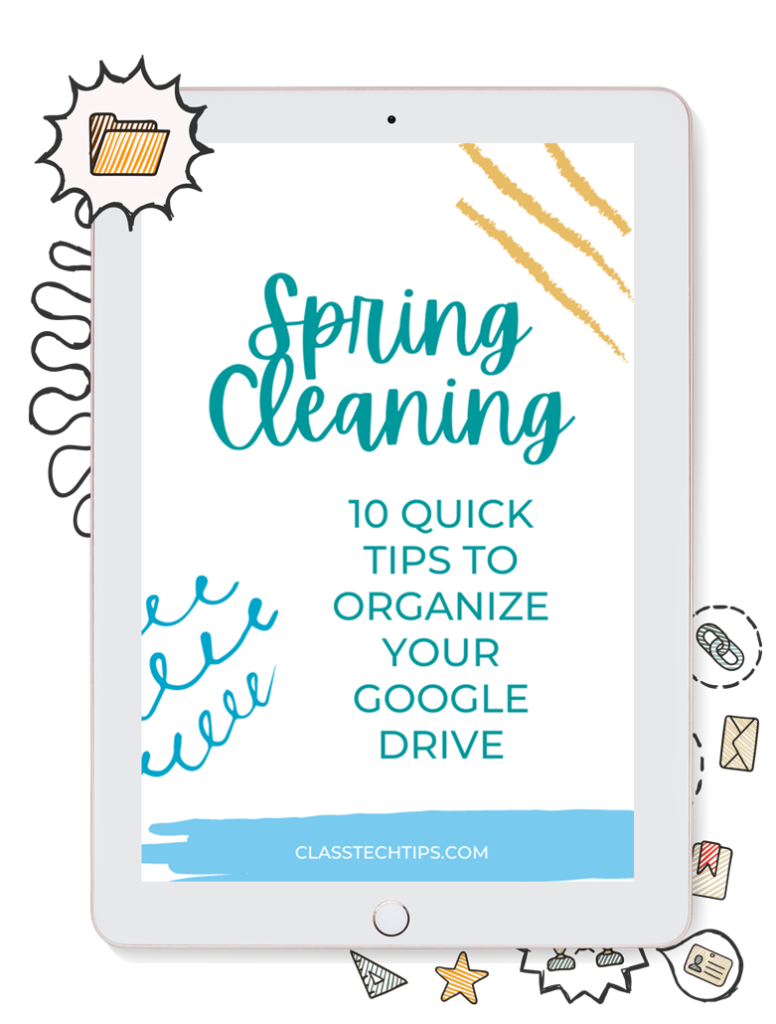
Spring Cleaning with an EdTech twist!
- Special eBook with 10 Quick Tips to Organize Your Google Drive
- If you're not using Google Drive, these strategies are customizable for Dropbox, Office365 and more!
- Get a fresh start this spring with these actionable tips for cleaning up your online organizational systems
Are you an EdTech company interested in getting featured on Class Tech Tips? Email [email protected]
Free planning pages, free summer checklist, spring cleaning guide, free - 10 quick tips to organize your google drive.
Learning from my mistakes: an English teacher's blog
Tuesday 27 june 2017, 200 word challenge tasks 2016/2017, 3 comments:.

Hi, I have to thank you for the efforts you’ve put in this blog. This is really helpful for us. English Teaching Jobs in Chiang Mai 120 hour tesol certificate
This can be really helpful if done exhaustively! Surely saving this. Thank you!
this is a really helpful stuff for us best paper writing service
Note: only a member of this blog may post a comment.
🎉 Our next novel writing master class starts in – ! Claim your spot →
WEEKLY WRITING PROMPTS
Join (probably?) the world's largest writing contest. Flex those creative muscles with weekly writing prompts.
Showing 2134 prompts
Action stations with tom bromley, write a story about a character driving and getting lost..
LIVE – Thriller and Suspense
Write a story about a tennis match between two rivals.
LIVE – Character
Write a story that begins with someone dancing in a bar.
Write a story around someone (literally) bumping into someone else..
LIVE – Funny
Write a story about a character running late for a job interview.
LIVE – Adventure

Introducing Prompted , a new magazine written by you!
🏆 Featuring 12 prize-winning stories from our community. Download it now for FREE .
Write a story titled 'Persuasion'.
Write a story titled 'the wind in the willows'., write a story titled 'desperate remedies'., write a story titled 'paradise lost'., write a story titled 'a tale of two cities'., subscribe to our prompts newsletter.
Never miss a prompt! Get curated writing inspiration delivered to your inbox each week.
Write a narrative about a group of scientists exploring the deepest parts of the ocean.
Imagine a world where exploration is forbidden, and write a story about a character who defies this rule to satisfy their innate curiosity., center your story around a character’s personal exploration, whether it's trying a new hobby, visiting an unfamiliar place, or learning something completely new., set your story on a spaceship exploring the far reaches of space when something goes wrong., write a story in the form of diary entries, written by an explorer as they make their way through what they thought was an untouched location., write about a character who treats everything like a game and struggles to be serious when they most need to, or vice versa., write a story about someone who takes a joke way too far., write a story about someone participating in a seemingly innocent game that suddenly takes a turn., set your story in a playground: two characters are having a serious conversation while on the seesaw/in the jungle gym/on the swings., write a story that includes the phrase “it’s all fun and games…”, win $250 in our short story competition 🏆.
We'll send you 5 prompts each week. Respond with your short story and you could win $250!
Contest #249 LIVE
Enter our weekly contest.
This week's theme: Action Stations with Tom Bromley
Prize money
Contest entries, closes at 23:59 - may 10, 2024 est, recent contests ✍️.
#248 – From the Top
#247 – The Great Unknown
#246 – All Fun and Games
#245 – Heavenly Bodies
Recent winners 🏆
Madeline McCourt – read
Sarah Coury – read
Olivier Breuleux – read
Kerriann Murray – read
Leaderboard 🥇
#1 Zilla Babbitt
32366 points
#2 Deidra Whitt Lovegren
28720 points
#3 Abigail Airuedomwinya
22420 points
#4 Graham Kinross
14500 points
#5 Scout Tahoe
13196 points
#6 Chris Campbell
11236 points
#7 Thom With An H
10613 points
#8 Rayhan Hidayat
10212 points
#9 Michał Przywara
9894 points
#10 Deborah Mercer
9610 points

Bring your short stories to life
Fuse character, story, and conflict with tools in the Reedsy Book Editor. 100% free.
Creative Writing Prompts
When the idea to start a weekly newsletter with writing inspiration first came to us, we decided that we wanted to do more than provide people with topics to write about. We wanted to try and help authors form a regular writing habit and also give them a place to proudly display their work. So we started the weekly Creative Writing Prompts newsletter. Since then, Prompts has grown to a community of more than 450,000 authors, complete with its own literary magazine, Prompted .
Here's how our contest works: every Friday, we send out a newsletter containing five creative writing prompts. Each week, the story ideas center around a different theme. Authors then have one week — until the following Friday — to submit a short story based on one of our prompts. A winner is picked each week to win $250 and is highlighted on our Reedsy Prompts page.
Interested in participating in our short story contest? Sign up here for more information! Or you can check out our full Terms of Use and our FAQ page .
Why we love creative writing prompts
If you've ever sat in front of a computer or notebook and felt the urge to start creating worlds, characters, and storylines — all the while finding yourself unable to do so — then you've met the author's age-old foe: writer's block. There's nothing more frustrating than finding the time but not the words to be creative. Enter our directory! If you're ready to kick writer's block to the curb and finally get started on your short story or novel, these unique story ideas might just be your ticket.
This list of 1800+ creative writing prompts has been created by the Reedsy team to help you develop a rock-solid writing routine. As all aspiring authors know, this is the #1 challenge — and solution! — for reaching your literary goals. Feel free to filter through different genres, which include...
Dramatic — If you want to make people laugh and cry within the same story, this might be your genre.
Funny — Whether satire or slapstick, this is an opportunity to write with your funny bone.
Romance — One of the most popular commercial genres out there. Check out these story ideas out if you love writing about love.
Fantasy — The beauty of this genre is that the possibilities are as endless as your imagination.
Dystopian – Explore the shadowy side of human nature and contemporary technology in dark speculative fiction.
Mystery — From whodunnits to cozy mysteries, it's time to bring out your inner detective.
Thriller and Suspense — There's nothing like a page-turner that elicits a gasp of surprise at the end.
High School — Encourage teens to let their imaginations run free.
Want to submit your own story ideas to help inspire fellow writers? Send them to us here.
After you find the perfect story idea
Finding inspiration is just one piece of the puzzle. Next, you need to refine your craft skills — and then display them to the world. We've worked hard to create resources that help you do just that! Check them out:
- How to Write a Short Story That Gets Published — a free, ten-day course by Laura Mae Isaacman, a full-time editor who runs a book editing company in Brooklyn.
- Best Literary Magazines of 2023 — a directory of 100+ reputable magazines that accept unsolicited submissions.
- Writing Contests in 2023 — the finest contests of 2021 for fiction and non-fiction authors of short stories, poetry, essays, and more.
Beyond creative writing prompts: how to build a writing routine
While writing prompts are a great tactic to spark your creative sessions, a writer generally needs a couple more tools in their toolbelt when it comes to developing a rock-solid writing routine . To that end, here are a few more additional tips for incorporating your craft into your everyday life.
- NNWT. Or, as book coach Kevin Johns calls it , “Non-Negotiable Writing Time.” This time should be scheduled into your routine, whether that’s once a day or once a week. Treat it as a serious commitment, and don’t schedule anything else during your NNWT unless it’s absolutely necessary.
- Set word count goals. And make them realistic! Don’t start out with lofty goals you’re unlikely to achieve. Give some thought to how many words you think you can write a week, and start there. If you find you’re hitting your weekly or daily goals easily, keep upping the stakes as your craft time becomes more ingrained in your routine.
- Talk to friends and family about the project you’re working on. Doing so means that those close to you are likely to check in about the status of your piece — which in turn keeps you more accountable.
Arm yourself against writer’s block. Writer’s block will inevitably come, no matter how much story ideas initially inspire you. So it’s best to be prepared with tips and tricks you can use to keep yourself on track before the block hits. You can find 20 solid tips here — including how to establish a relationship with your inner critic and apps that can help you defeat procrastination or lack of motivation.
NEW VIDEO COURSE 🎉
How to Write a Novel
Join Tom Bromley for a writing master class and finish your first draft in 3 months . Learn more →
Explore more writing prompt ideas:
Adults Writing Prompts ⭢
Adventure Writing Prompts ⭢
Angst Writing Prompts ⭢
Character Writing Prompts ⭢
Christmas Writing Prompts ⭢
Dark Writing Prompts ⭢
Dialogue Writing Prompts ⭢
Dramatic Writing Prompts ⭢
Dystopian Writing Prompts ⭢
Fall Writing Prompts ⭢
Fantasy Writing Prompts ⭢
Fiction Writing Prompts ⭢
Fluff Writing Prompts ⭢
Funny Writing Prompts ⭢
Halloween Writing Prompts ⭢
High School Writing Prompts ⭢
Historical Fiction Writing Prompts ⭢
Holiday Writing Prompts ⭢
Horror Writing Prompts ⭢
Kids Writing Prompts ⭢
Middle School Writing Prompts ⭢
Mystery Writing Prompts ⭢
Narrative Writing Prompts ⭢
Nonfiction Writing Prompts ⭢
Novel Writing Prompts ⭢
Poetry Writing Prompts ⭢
Romance Writing Prompts ⭢
Sad Writing Prompts ⭢
Science Fiction Writing Prompts ⭢
Short Story Writing Prompts ⭢
Spring Writing Prompts ⭢
Summer Writing Prompts ⭢
Teens Writing Prompts ⭢
Thanksgiving Writing Prompts ⭢
Thriller and Suspense Writing Prompts ⭢
Valentine's Day Writing Prompts ⭢
Vampire Writing Prompts ⭢
Winter Writing Prompts ⭢
Oops, you need an account for that!
Log in with your social account:
Or enter your email:

FREE 5-Day Writing Challenge
Develop a lifelong writing habit in just 5 days.
Commit to writing just 200 words a day for 5 days, and watch your writing habits transform.
During this FREE, immersive 5-day challenge, you'll experience:
- Practical, Achievable Goals : Discover the power of small, daily actions with the simple commitment to write 200 words a day.
- A Proven Process : Discover the exact process to develop and maintain a writing habit that will last a lifetime.
- Simplicity and Impact : Learn how just a few minutes a day can help you consistently integrate writing into your life, no matter your schedule or list of commitments.
- Transformational Growth : Uncover how a simple writing habit can lead to significant changes in your confidence, creativity, and productivity.
- Step-by-Step Guidance : Walk through the process of starting small, with resources specifically designed to support your journey to a lasting writing habit.
- Bestseller Secrets : Discover the tools, strategies, and mindset hacks the world's leading bestselling authors use every day to make writing a consistent habit in their busy lives, no matter what.
- Community Support : Join a vibrant, private community of like-minded writers, all embarking on this journey together.
- Live Teaching & Coaching: For the first time, get direct access to live support and coaching during the free challenge, making your journey even more personal and impactful.
Your 5-Day Challenge Begins
Monday, may 13th.
You missed out!
Enter your name and email address below to reserve your spot in the free challenge.
"This experiment helped me find my writing groove again! I had become so scared of writing something of poor quality that I stopped writing for a few months straight. The daily goal was enough to push me to write reliably, but without overstretching or intimidating me! I would recommend it to anyone struggling to establish a regular writing habit."
Georgia Bird
Your 5-day challenge begins:.
Copyright 2024 © Bestseller Academy - All Rights Reserved

How to Write Micro-Fiction: The 200-Word Short Story

Writing a complete story in exactly 200 words can be a bit of a challenge, especially when the stories must contain a beginning, middle, and end. After all, that’s sort of what makes a story out of a grouping of individual words, right?
The trick is to arrange those 200 words into an order that makes them pleasing to our eyes, ears, brains, emotions, and our hearts. In other “words” (pun intended), readers want to feel what they read.
So what’s the best way to get started on these micro creations? Easy answer. You need a subject/topic/story.
Small ideas
Keep the idea small. A BIG story can be far too convoluted to cut to a maximum goal of, say, 200 words, such as the word count for the wildly popular Golden Donut Short Story Contest.
You’ve often heard me speak of police officers needing to avoid tunnel vision and that need is for a few reasons, safety being number one. Number two is to avoid missing any and all details, including details that may later prove to be unnecessary to the case.
The opposite is true when writing flash fiction. Writers need a dose of tunnel vision to help them complete their word-challenged stories. Keeping on the blinders, focusing mostly on the end, helps to avoid the use of unneeded words.
The inspiration
No inspiration? No ideas? Brain as empty as a California lake in the summertime? Easy answer.

Use a photo prompt
For inspiration, pick a photo from your last vacation. Maybe you saw a cool image on someone’s website, the newspaper, a blog.
Okay, you have an idea for a story. What’s next? Again, easy answer.
Where to start?
What about starting in the middle of the story, where the character’s conflict begins, avoiding the use of backstory, flashbacks, prologues, and other filler. Why do this? You don’t have the space for it for one thing. Every single word must count when writing flash fiction. This is even more crucial with writing micro-flash fiction. Shorter paragraphs helps when editing.
This, however, is not the time to worry about the word count. Simply write the story and let the words flow. You can trim later.
You absolutely must make your readers feel … something. It is up to you to decide what that something truly is. But whatever you select, be sure to keep it simple. There is not enough space to branch out too far, so pick a couple of focus areas and perhaps start out having your readers experience one feeling at the onset but end with a different emotion altogether. Their rollercoaster ride will be worth your effort. But DO NOT go overboard. This is not the place for emotion that doesn’t remain within the boundaries of your tunnel vision-esque story.

Keep in mind that your story and/or characters may develop a different appearance than the one in your mind when you first sat down to write.
Character Arc
Sure, your tale is only 200 words in length (or 50 or 1,000), but your character absolutely must grow within that confined space.
Skip them. there’s no room. Stick to a main theme.
SHOW, SHOW, SHOW!
This goes without saying. SHOW the action in your story. Don’t tell us. For example:
“They jumped until they quit.”
The line is a bit vague. It tells us something, but it’s extremely uninteresting. How about …
“Tom and Nancy played a game, seeing who could hop up and down the longest. Tom lost.”
I know. Not the best writing in the world, but you get the idea.
Beginning, Middle, End, and CONFLICT!
Writing flash fiction is not an excuse to cut corners. Each story must have a beginning, middle, and end (a twisted ending is sometimes a nice surprise). And there must be conflict and story resolution. We must feel the struggle (be it internal or external) and then we must see relief (emotional or physical) from that conflict.
The title of a work of flash fiction is extremely important (especially if it’s also part of the word count). It’s the hook. It must cause the reader to stop in their tracks to read your story. It must be THAT compelling. But do not allow it to be so doggone good that it gives away the entire story.
Okay, you’ve finished your masterpiece. What next?
Now’s the time to break out the carving knives and go to work trimming all the fat. Why? Because your 200 word tale comes in somewhere the other side of 100,000 words. Why? Because you love to hear yourself write. You love your fancy-smancy words and you love your voice and your story was absolutely far too good to tell in only … 200 words???
Okay, with red pen sharpened it’s time to cut all the “LY” words and the other stuff you don’t need.
For example, Billy needs to let his mother know he’ll be late coming home after school. That’s all she needs to know to help our story advance. So we, a group of unapologetic flowery writers, write.
Billy picked up the black phone, the one with the blue buttons and the $200 screen protector, and used it to call his mom, a server at Pete’s Possum Gut Gourmet Diner and Horse-Shoeing Parlor, to tell her that he’d be late coming home after school because he wanted to play ball with 12 or 15 of his friends at the church lot over on Elm.
Well, we know a lot about Billy, his mom and his friends and the area. But how much information do we really need to get the point across? How’s this?
Billy called his mom to say he’d be late for dinner.
69 words in the first sentence. 12 in the latter.
Words to lose – the space wasters.
These words are very nice words. I like them a lot. They’re amazing, good, incredible, and just plain uniquely and totally and pleasantly perfect. But avoid them if at all possible. You don’t need them. They’re space wasters.
a lot absolutely actually amazing basically essentially funny given the fact that good hopefully incredible just kind of literally many nice perfect perhaps pleasant pretty probably quite really so sort of suddenly totally truly unique usually very
And other words ending in “LY.”
Now You’re Ready …
to enter the Golden Donut Short Story Contest and win the Golden Donut Award and FREE registration to the 2018 Writers’ Police Academy (prize value is well over $400). Submission deadline is July 2, 2017. This is a FUN contest!!
Here are some of the stories (and a photo prompt) from past contests.
Golden Donut 200-Word stories
You might also like

I’m sending everyone who tells me, “I’d like to write a short story” to this article! Great tips.
Comments are closed.
Police procedure and investigation: a guide for writers.

Countdown to 2024 KILLER CON
Writers’ police academy.
The 2024 Writers’ Police Academy is a special event called Killer Con, which is designed to help writers create stunning realism in their work, Killer Con focuses on the intricate details surrounding the crime of murder and subsequent investigations.
Visit The WPA website to register!
*The Writers’ Police Academy (WPA) is held every year and offers an exciting and heart-pounding interactive and educational hands-on experience for writers to enhance their understanding of all aspects of law enforcement, firefighting, EMS, and forensics.
Get to Know Lee Lofland
Lee Lofland is a nationally acclaimed expert on police procedure and crime-scene investigation, and is a popular conference, workshop, and motivational speaker.
Lee has consulted for many bestselling authors, television and film writers, and for online magazines. Lee has appeared as an expert on national television, BBC Television, and radio shows.
Lee is the host and founder of the Writers’ Police Academy, an exciting, one-of-a-kind, hands-on event where writers, readers, and fans learn and train at an actual police academy.
To schedule Lee for your event, contact him at [email protected]

100 Word Prompts for Writing: Boost Your Creativity with These Simple Words
By: Author Paul Jenkins
Posted on August 1, 2023
Categories Writing
If you’re a writer looking for inspiration, one of the best tools at your disposal is word prompts. These are single words or short phrases that can spark your creativity and help you come up with new ideas for your writing. Whether you’re struggling with writer’s block or just looking for a fun challenge, word prompts can be a great way to get your creative juices flowing.
There are many different types of word prompts available, ranging from simple nouns like “tree” or “book” to more complex phrases like “lost in the woods” or “abandoned mansion.”
Some prompts are specific to certain genres, like romance or horror, while others can be used for any type of writing. No matter what kind of writing you’re interested in, there’s sure to be a word prompt that can help you generate new ideas and explore different directions for your work.
Using word prompts can have many benefits for writers. They can help you break out of your comfort zone and try new things, as well as provide a starting point for your writing that you might not have thought of otherwise.
Additionally, by using prompts regularly, you can develop your writing skills and become more confident in your ability to generate ideas and write creatively. So if you’re looking for a way to boost your writing practice, consider incorporating word prompts into your routine.
Key Takeaways
- Word prompts are a useful tool for writers looking for inspiration and new ideas.
- There are many different types of word prompts available, including genre-specific prompts and prompts for different age groups.
- Using word prompts regularly can help writers break out of their comfort zone, develop their skills, and become more confident in their writing abilities.
Understanding Word Prompts for Writing
When it comes to writing, prompts are an excellent way to get your creative juices flowing. A writing prompt is a word, phrase, or sentence that serves as a starting point for your writing. It can be a tool to help you overcome writer’s block or a way to challenge yourself to write something new and exciting.
One type of writing prompt that has gained popularity in recent years is the one-word writing prompt. These prompts are exactly what they sound like – a single word that serves as the inspiration for your writing. One-word prompts can be especially useful for generating new ideas and exploring different themes in your writing.
To make the most of a writing prompt, it’s essential to understand what it’s asking you to do. Before you start writing, take some time to analyze the prompt and consider what it means. Look for key words and phrases that can guide your writing and help you stay on track.
When working with a one-word prompt, think about the different meanings and associations that the word has. Consider how the word makes you feel and what images or ideas it brings to mind. Use this information to guide your writing and create a piece that is both unique and engaging.
In summary, writing prompts can be a powerful tool for writers of all levels. One-word prompts, in particular, are a great way to challenge yourself and explore new themes in your writing. By taking the time to understand the prompt and using it as a starting point, you can create something truly special and unique.
Here Are 100 One-Word Writing Prompts
1. Sunset 2. Raindrop 3. Butterfly 4. Seashell 5. Feather 6. Rose 7. Wind 8. Wave 9. Forest 10. Mountain 11. River 12. Desert 13. Island 14. Ocean 15. Lake 16. Morning 17. Night 18. Dawn 19. Dusk 20. Journey 21. Adventure 22. Discovery 23. Mystery 24. Secret 25. Surprise 26. Imagination 27. Courage 28. Hope 29. Dream 30. Vision 31. Success 32. Failure 33. Friendship 34. Loyalty 35. Betrayal 36. Forgiveness 37. Regret 38. Memory 39. Childhood 40. Growing 41. Learning 42. Searching 43. Finding 44. Losing 45. Waiting 46. Returning 47. Leaving 48. Arriving 49. Beginning 50. Ending 51. Change 52. Stillness 53. Silence 54. Noise 55. Darkness 56. Light 57. Shadow 58. Fear 59. Joy 60. Sorrow 61. Anger 62. Calm 63. Storm 64. Shelter 65. Escape 66. Refuge 67. Peace 68. War 69. Victory 70. Defeat 71. Strength 72. Weakness 73. Pride 74. Humility 75. Kindness 76. Cruelty 77. Love 78. Hate 79. Truth 80. Lies 81. Freedom 82. Captivity 83. Wisdom 84. Folly 85. Courage 86. Danger 87. Safety 88. Risk 89. Reward 90. Loss 91. Serenity 92. Chaos 93. Order 94. Confusion 95. Clarity 96. Obscurity 97. Light 98. Darkness 99. Life 100. Death
Types of Word Prompts
There are different types of word prompts that can help spark your creativity. Here are some of the most common types:
Action Prompts
Action prompts are words that suggest movement or activity. They can be used to write about a character’s physical actions or to describe a scene. Some examples of action prompts include:
Using action prompts can help you create dynamic scenes and add energy to your writing.
Emotion Prompts
Emotion prompts are words that evoke a particular feeling or mood. They can be used to explore a character’s emotions or to set the tone of a scene. Some examples of emotion prompts include:
Using emotion prompts can help you create more nuanced characters and add depth to your writing.
Setting Prompts
Setting prompts are words that suggest a particular location or environment. They can be used to describe a scene or to create a sense of atmosphere. Some examples of setting prompts include:
- Underground
Using setting prompts can help you create vivid, immersive worlds that draw readers in.
By using different types of word prompts, you can generate a wide range of writing ideas and explore different aspects of your characters and stories. Experiment with different types of prompts and see what works best for you.
Benefits of Using Word Prompts
Using word prompts can offer a variety of benefits to writers of all levels. Here are some of the benefits you can expect when using word prompts:
1. Inspiration
Word prompts can be an excellent source of inspiration for writers who are struggling to come up with ideas. They can help you break out of writer’s block and get your creative juices flowing. By providing a starting point, word prompts can help you generate new and exciting ideas that you might not have considered otherwise.

2. Creativity
Word prompts can also help you develop your creativity by encouraging you to think outside the box. When you’re given a specific word or phrase to work with, you’re forced to come up with creative ways to incorporate it into your writing. This can help you develop your creativity and expand your writing skills.
3. Imagination
Word prompts can also help you tap into your imagination and explore new ideas and concepts. By providing a starting point, word prompts can help you imagine new worlds, characters, and scenarios that you might not have considered otherwise. This can help you develop your imagination and expand your writing skills.
4. Productivity
Using word prompts can also help you become more productive as a writer. By providing a starting point, word prompts can help you get started on your writing more quickly and easily. This can help you overcome procrastination and writer’s block, and can help you produce more writing in less time.
Overall, using word prompts can be an excellent way to improve your writing skills and develop your creativity, imagination, and productivity. Whether you’re a beginner or an experienced writer, using word prompts can help you take your writing to the next level.
How to Use Word Prompts Effectively
Word prompts can be a powerful tool to help you generate ideas, begin your writing, and provide direction for your writing journey. Here are some tips on how to use word prompts effectively:
1. Choose the Right Word Prompt
Choose a word prompt that resonates with you or sparks your imagination. Don’t be afraid to choose a word that challenges you or takes you out of your comfort zone. The goal is to use the word prompt as a starting point for your writing, so choose a word that inspires you to write.
2. Use the Word Prompt as a Starting Point
Use the word prompt as a launching pad for your writing. Don’t try to force the word into your writing, but let it guide you in a natural way. The word prompt can be used as a way to brainstorm ideas or as a way to begin your writing.
3. Let Your Writing Take You on a Journey
Let your writing take you on a journey. Don’t worry about where your writing is going or how it will end. The journey is the destination, and the word prompt is just the beginning.
4. Embrace the Process
Embrace the process of writing. Writing is a journey, and it’s important to enjoy the process along the way. Don’t worry about being perfect or having all the answers. The beauty of writing is in the journey, and the word prompt is just the beginning of that journey.
By following these tips, you can use word prompts effectively to generate ideas, begin your writing, and provide direction for your writing journey.
Word Prompts for Different Genres
If you’re a writer, you know that sometimes it can be difficult to come up with new ideas. That’s where word prompts come in. Word prompts are a great way to get your creative juices flowing and to help you come up with new and exciting story ideas. Here are some word prompts for different genres that you can use to get started.
Fiction Prompts
If you’re looking for fiction prompts, there are plenty of options out there. You can use a single word or a phrase to get started. Here are a few examples:
- “The last time you saw her”
- “A knock at the door”
- “The sound of footsteps”
Using these prompts, you can create a story that is unique and engaging. You can use them as a starting point and build your story from there.
Mystery Prompts
Mystery stories are all about suspense and intrigue. Here are some prompts that can help you create a compelling mystery:
- “A missing object”
- “A secret room”
- “A mysterious phone call”
With these prompts, you can create a story that will keep your readers on the edge of their seats. You can use them to create a plot that is full of twists and turns.
Adventure Prompts
Adventure stories are all about excitement and danger. Here are some prompts that can help you create an adventurous tale:
- “A lost city”
- “A treasure map”
- “A dangerous journey”
With these prompts, you can create a story that is full of action and adventure. You can use them to create a plot that is full of challenges and obstacles.
No matter what genre you’re writing in, word prompts can be a great way to get started. They can help you come up with new and exciting ideas that you may not have thought of otherwise. So the next time you’re feeling stuck, try using a word prompt to help you get started.
Creating Your Own Word Prompts
If you’re looking to invent unique writing prompts, you can use your imagination and creativity to come up with words that inspire you. Here are some tips to help you create your own word prompts:
- Think about your interests and hobbies. What are some words that come to mind when you think about these topics? For example, if you’re interested in gardening, you could use words like “soil,” “seeds,” or “bloom.”
- Consider using words that evoke strong emotions. Words like “love,” “hate,” “fear,” or “joy” can be powerful prompts that encourage you to explore your feelings in your writing.
- Use random word generators to spark your creativity. There are many online tools that can generate random words for you to use as prompts. You can use these words as they are or combine them to create your own unique prompts.
- Create a list of words that you find interesting or unusual. You can use these words as prompts for your writing, or combine them with other words to create more complex prompts.
Once you have a list of word prompts, you can use them in a variety of ways. You can choose one word each day and write a short story or poem inspired by that word. You can also use multiple words to create more complex prompts that challenge you to explore different themes and ideas in your writing.
The key to creating your own word prompts is to be open to new ideas and willing to experiment with different approaches. With a little creativity and imagination, you can come up with word prompts that inspire you to write and help you develop your skills as a writer.
Word Prompts for Different Age Groups
Prompts for children.
Word prompts are a great way to encourage children to write creatively. They can help children to develop their vocabulary, improve their writing skills, and express their thoughts and feelings. Here are some word prompts that are suitable for children:
Prompts for Teens
Teens often have a lot on their minds, and word prompts can be a great way to help them express themselves. Here are some word prompts that are suitable for teenagers:
Prompts for Adults
Word prompts can be a useful tool for adults who want to improve their writing skills or explore their creativity. Here are some word prompts that are suitable for adults:
No matter your age, word prompts can be a fun and effective way to get your creative juices flowing. Whether you’re a student, a parent, or just someone who loves to write, try using some of these word prompts to inspire your next writing project.
Word Prompts for Group Writing Activities
If you are looking for a fun and engaging way to get your writing group to work together, using word prompts is a great option. Word prompts can be used to inspire creativity, encourage collaboration, and provide a starting point for group writing activities.
One way to use word prompts in a group writing activity is to give each member of the group a different word and then have them write a paragraph or short story that incorporates all of the words. This activity can help to build unity within the group as everyone works together to create a cohesive story.
Another option is to use a single word prompt and have everyone in the group write their own story or poem based on that word. This activity allows for individual creativity while still providing a common starting point for everyone.
When choosing word prompts for group writing activities, it is important to consider the interests and skill levels of everyone in the group. You want to choose words that are challenging but not so difficult that they discourage participation.
Here are a few examples of word prompts that could be used in group writing activities:
By using word prompts in your group writing activities, you can encourage everyone to work together, inspire creativity, and have fun while writing.
Incorporating Word Prompts in Daily Writing
If you’re looking to improve your writing skills or simply want to write more frequently, incorporating word prompts into your daily writing routine can be an effective strategy.
Word prompts can be a single word, phrase, or sentence that inspires you to write on a specific topic or theme. Here are a few ways you can incorporate word prompts into your daily writing:
Use Word Prompts in Your Journal
If you keep a journal, using word prompts can help you explore new topics and ideas. You can use a different word prompt each day or week to challenge yourself to write about something new.
For example, if your word prompt is “adventure,” you could write about a recent adventure you had or imagine a future adventure you’d like to take.
Use Word Prompts in Your Letters
If you enjoy writing letters to friends and family, using word prompts can help you add variety to your correspondence. You can use a different word prompt for each letter you write or use the same prompt for multiple letters to explore different angles or perspectives.
For example, if your word prompt is “memories,” you could write about a favorite childhood memory or ask your recipient to share a memorable experience of their own.
Use Word Prompts to Write News Articles
If you’re interested in journalism, using word prompts can help you practice writing news articles on different topics. You can use a different word prompt each day or week to challenge yourself to write about a newsworthy event or issue. For example, if your word prompt is “climate change,” you could write about the latest climate change research or the impact of climate change on a specific community.
Use Word Prompts for Daily Writing Practice
If you want to improve your writing skills, using word prompts for daily writing practice can be a helpful tool. You can set aside a specific time each day to write on a different word prompt or use the same prompt for multiple days to explore different angles or perspectives.
For example, if your word prompt is “time,” you could write about the importance of time management or reflect on a significant moment in your life.
Incorporating word prompts into your daily writing can help you stay motivated, explore new topics, and improve your writing skills. Whether you’re writing in a journal, writing letters, or practicing journalism, using word prompts can be a fun and effective way to enhance your daily writing routine.
Special Word Prompts
If you are looking for some unique and exciting writing prompts, then special word prompts can be a great option to explore. These prompts can help you to unleash your creativity and come up with some truly amazing ideas. In this section, we will explore some of the most popular types of special word prompts that you can use to spark your imagination.
One-Word Prompts
One-word prompts are an excellent way to get started on a writing project. They are simple, yet effective, and can help you to focus your thoughts and ideas. Some examples of one-word prompts include “love,” “fear,” “adventure,” “mystery,” and “hope.” You can use these prompts to write a short story, a poem, or even a novel. The possibilities are endless.
Picture Prompts
Picture prompts are another great option for writers who are looking for something a little different. These prompts involve using a photograph or image as inspiration for your writing. You can use the image to create a setting, a character, or even a plot. Some examples of picture prompts include a deserted beach, a crowded city street, or a spooky forest. You can use these prompts to write a descriptive paragraph, a short story, or even a novel.
Music Prompts
If you are a music lover, then music prompts can be a great way to get inspired. These prompts involve using a song or piece of music as inspiration for your writing. You can use the lyrics or the melody to create a mood, a character, or even a story. Some examples of music prompts include “Yesterday” by The Beatles, “Bohemian Rhapsody” by Queen, or “Stairway to Heaven” by Led Zeppelin. You can use these prompts to write a poem, a short story, or even a screenplay.
In conclusion, special word prompts can be a great way to get inspired and come up with some truly amazing writing ideas. Whether you prefer one-word prompts, picture prompts, or music prompts, there is something out there for everyone. So, go ahead and give them a try. You never know what you might come up with.
Word Prompts for Self-Exploration and Personal Growth
Writing is a powerful tool for self-exploration and personal growth. When you write, you can explore your thoughts, feelings, and experiences in a safe and private space. Word prompts can help you get started and guide you on your writing journey. Here are some word prompts for self-exploration and personal growth:
Writing about yourself can help you gain a deeper understanding of who you are and what makes you unique. Here are some word prompts to explore yourself:
- Describe your strengths and weaknesses.
- Write about a time when you felt proud of yourself.
- What are your values and beliefs?
- What are your goals and aspirations?
- What are your fears and insecurities?
Writing can help you explore new ideas, perspectives, and experiences. Here are some word prompts to help you explore:
- Write about a place you’ve never been before.
- What are your thoughts on a controversial issue?
- Write a letter to your future self.
- Describe a challenge you overcame.
- What are some things you’ve always wanted to try but haven’t yet?
Writing can help you reflect on your experiences and learn from them. Here are some word prompts to help you grow:
- Write about a mistake you made and what you learned from it.
- What is something you’ve changed your mind about?
- Describe a time when you had to step out of your comfort zone.
- Write about a person who has had a significant impact on your life.
- What are some areas you want to improve in?
Personal Growth
Writing can help you track your progress and set goals for personal growth. Here are some word prompts to help you focus on personal growth:
- What are your priorities in life?
- Write about a time when you had to make a difficult decision.
- Describe a time when you felt fulfilled.
- What are some habits you want to develop or break?
- Write about a goal you’ve achieved and how you did it.
In conclusion, word prompts can be a valuable tool for self-exploration and personal growth. By using these prompts, you can gain a deeper understanding of yourself, explore new ideas and experiences, reflect on your experiences, and track your progress towards personal growth.
Word Prompts for Story Development
When it comes to developing a story, word prompts can be a great tool to help you get started and overcome writer’s block. These prompts can be used for short stories, novels, or any other type of writing project.
Using word prompts can help you to create a plot and develop characters. They can also help you to explore different themes and ideas. Here are some tips for using word prompts for story development:
1. Choose a Word Prompt
Choose a word prompt that resonates with you and fits the type of story you want to write. You can find word prompts online or create your own. Some examples of word prompts include “love,” “fear,” “betrayal,” “adventure,” or “mystery.”
2. Brainstorm Ideas
Once you have chosen a word prompt, brainstorm ideas for your story. Think about how the prompt can be used to develop characters, create conflict, or drive the plot forward. You can use mind maps, index cards, or other brainstorming tools to help you generate ideas.
3. Develop Your Characters
Use the word prompt to develop your characters. Think about how the prompt relates to their backstory, personality, or motivations. Use the prompt to create conflict between characters or to drive their actions forward.
4. Create a Plot
Use the word prompt to create a plot for your story. Think about how the prompt can be used to create tension, build suspense, or drive the action forward. Use the prompt to create a twist or surprise ending.
5. Explore Themes
Use the word prompt to explore different themes and ideas in your story. Think about how the prompt relates to larger issues or questions. Use the prompt to create a message or moral for your story.
In conclusion, word prompts can be a powerful tool for developing a story. They can help you to create a plot, develop characters, and explore different themes and ideas. By following these tips, you can use word prompts to overcome writer’s block and create a compelling story.
Challenges in Using Word Prompts
Using word prompts for writing can be a fun and engaging way to get your creative juices flowing. However, it can also present some challenges that you may need to overcome to fully benefit from this exercise. Here are some of the difficulties you may face when using word prompts:
Challenge 1: Feeling Stuck
Sometimes, the word prompt you are given may not inspire you or may not seem interesting. You may feel stuck and unable to come up with any ideas. In such cases, it is important to remember that you do not have to write a masterpiece every time. Just start writing whatever comes to mind, even if it seems silly or unimportant. This can help you get past the initial hurdle of feeling stuck and may lead to more creative ideas later on.
Challenge 2: Lack of Direction
Another challenge you may face when using word prompts is a lack of direction. You may not know where to take your writing or what direction to go in. In such cases, it may be helpful to brainstorm some ideas before you start writing. You can also try breaking down the prompt into smaller parts and focusing on one aspect at a time.
Challenge 3: Overthinking
When using word prompts, it is easy to overthink and try to come up with the perfect idea. However, this can lead to writer’s block and prevent you from actually writing anything. To overcome this challenge, try to let go of your expectations and just write without worrying about the outcome. Remember that writing is a process, and not every idea has to be perfect.
Challenge 4: Limited Vocabulary
Using word prompts can also be challenging if you have a limited vocabulary. You may find it difficult to come up with different words or phrases to use in your writing. In such cases, it may be helpful to read more and expand your vocabulary. You can also use a thesaurus to find synonyms for words you commonly use.
Overall, using word prompts for writing can be a fun and rewarding exercise. However, it is important to be aware of the challenges that may arise and to find ways to overcome them. By doing so, you can unlock your creativity and improve your writing skills.
Frequently Asked Questions
What are some unique one-word writing prompts.
There are many unique one-word writing prompts that can inspire creativity. Some examples include “Surrender,” “Mirage,” “Euphoria,” “Enigma,” and “Serendipity.” One way to find more unique prompts is to think of uncommon words or concepts and use them as a starting point for your writing.
Where can I find a good writing prompts book?
There are many writing prompt books available online or in bookstores. Some popular options include “642 Things to Write About” by the San Francisco Writers’ Grotto, “The Daily Prompt: A Year of Writing Exercises” by Hannah Braime, and “The Writer’s Block: 786 Ideas to Jump-Start Your Imagination” by Jason Rekulak. You can also find many free writing prompt resources online.
What are some creative writing prompts for adults?
Creative writing prompts for adults can vary depending on your interests and writing goals. Some examples include “Write a story from the perspective of a tree,” “Describe a character’s dream job and how they achieve it,” or “Write a letter to your future self.” You can also find many creative writing prompt generators online that can provide unique and unexpected prompts.
What is an example of a successful writing prompt?
A successful writing prompt is one that inspires creativity and encourages writers to explore new ideas and perspectives. An example of a successful writing prompt might be “Write a story about a character who discovers a hidden door in their house and what they find behind it.” This prompt provides a clear starting point for a story while also leaving room for the writer to explore their imagination.
What are some two-word writing prompts?
Two-word writing prompts can be a fun and challenging way to spark creativity. Some examples include “Broken Dreams,” “Silent Thunder,” “Whispered Secrets,” “Hidden Treasure,” and “Fading Memories.” You can also create your own two-word prompts by combining words that have interesting or contrasting meanings.
Where can I find a daily word prompt generator?
There are many daily word prompt generators available online that can provide a new prompt every day. Some popular options include “OneWord,” “The Daily Post,” and “Writing Prompts.” These generators can be a great way to challenge yourself to write regularly and explore new ideas.
The Learning Profession
Every day is a school day…

On the Weekly Writing Challenge
If you’re an English teacher on Twitter you will have found it hard to have missed the 200 Word Challenge idea which was the brain child of Chris Curtis (see this post ). It’s taken off and lots of English teachers around the country have taken his lead. We decided, after Easter, to join the 200 Word Challenge revolution; we’ve not looked back.
Every week, every student in KS3 has a Weekly Writing Challenge lesson. It has evolved a little over the weeks so that the ingredients we want students to include has moved more towards slow writing ingredients and we’ve just added a 5-a-Day retrieval practice (self mark) starter for the ambitious vocabulary we expect KS3 students to learn as part of their homework. I expect it will evolve further.
We will review the Weekly Writing Challenge properly at the end of the year (a post to follow) including getting some student feedback. However, I thought I might share our Weekly Challenge resources in case you fancy joining the #200wordchallengerevolution.

Here’s a dropbox link: here .
Share this:
- Pingback: Weekly writing challenge | Driffield School and Sixth Form Teaching and Learning Blog
- Pingback: On Redesigning the KS3 English Curriculum Part 2 #rEDRugby | The Learning Profession
- Pingback: On our Weekly Writing Challenges 2017-18 | The Learning Profession
- Pingback: KS3 Curriculum Design – In the Cornish Classroom
Leave a comment Cancel reply

- Already have a WordPress.com account? Log in now.
- Subscribe Subscribed
- Copy shortlink
- Report this content
- View post in Reader
- Manage subscriptions
- Collapse this bar
Awaken English
All things Educational. Sharing resources for Secondary English
200 Word Challenge
Inspired by the lead up to UAE’s National Day our KS3 students are creating some detailed description based on iconic landscapes and buildings which have become world renowned.
200 Word Challenge – National Day

Share this:
Leave a comment cancel reply.

- Already have a WordPress.com account? Log in now.
- Subscribe Subscribed
- Copy shortlink
- Report this content
- View post in Reader
- Manage subscriptions
- Collapse this bar

reading, writing and design
Tag: 200 word challenges.

Do you do ‘200 word Challenges’ in English lessons? Here’s what they’re for…
Lots of schools started doing 200-word challenges as a quick way to sharpen up GCSE students’ writing skills. I’ve noticed, in working as a tutor, however, that not all students know why they’re doing them. If that’s you, read on – this is what they can help you achieve. They help remind you to use… More Do you do ‘200 word Challenges’ in English lessons? Here’s what they’re for…

- My presentations
Auth with social network:
Download presentation
We think you have liked this presentation. If you wish to download it, please recommend it to your friends in any social system. Share buttons are a little bit lower. Thank you!
Presentation is loading. Please wait.
Produce a piece of creative writing inspired by this image.
Published by April Bates Modified over 6 years ago
Similar presentations
Presentation on theme: "Produce a piece of creative writing inspired by this image."— Presentation transcript:
Writing to inform, explain, describe Tuesday 8 th March / Wednesday 9 th March.

You are a writer! You have an experience to share, a point to make, a story to tell.

How many similes / metaphors / personification can you think of to describe a storm? Challenge – can you link your examples to the theme of power and.

Unit 3, Week 5 Snowflake Bentley O’Neal Elementary 4 th Grade.

Supporting Your Child with writing Parents Meeting 19 th March 9am Welcome.

{ Creative Writing – Year 7 LO: to work on exam strategies for the creative writing question.

Syntax Variety in Writing. Grammar and vocab together! Phrase: a group of two or more words that express a single idea but do not usually form a complete.

Haiku Series How to Create Your Own. Definition A Japanese verse in three lines. A Japanese verse in three lines. Line one has 5 syllables, line 2 has.

Book Bands Complements guided reading practice in school Ensures children reading at appropriate level Recommended by the Institute of Education.

Welcome to GCSE English language and English literature

Which quote is the ODD ONE OUT? Simon Armitage

PLEASE LEAVE SPACE FOR DIT

Poetry anthology Key quotes test

Paper 1 Question 5 : - used to list things.

Words and Ideas from ‘Christmas Carol’ Reminder for technical accuracy

Power and conflict Los: To know the key themes in the poems

Just when you think it can’t get anymore difficult....

Words and Ideas from Macbeth: Reminder for technical accuracy

Writing PEE example Jump Up – John Agard.

Knowledge Checking In what year was Jekyll and Hyde published?
About project
© 2024 SlidePlayer.com Inc. All rights reserved.
- International
- Schools directory
- Resources Jobs Schools directory News Search

200 Word/Writing Challenges: KS3
Subject: English
Age range: 11-14
Resource type: Lesson (complete)
Last updated
29 August 2022
- Share through email
- Share through twitter
- Share through linkedin
- Share through facebook
- Share through pinterest

31 200 word challenges. Aimed at providing general knowledge and cultural capital.
Tes paid licence How can I reuse this?
Your rating is required to reflect your happiness.
It's good to leave some feedback.
Something went wrong, please try again later.
This resource hasn't been reviewed yet
To ensure quality for our reviews, only customers who have purchased this resource can review it
Report this resource to let us know if it violates our terms and conditions. Our customer service team will review your report and will be in touch.
Not quite what you were looking for? Search by keyword to find the right resource:
200 word challenge
Transactional writing
Lit linked 200wc for Romeo and Juliet, AIC, ACC @saysmiss
You need to login or register to continue, description.
Lit linked non fiction tasks for Romeo and Juliet, An Inspector Calls and A Christmas Carol.
Author Info
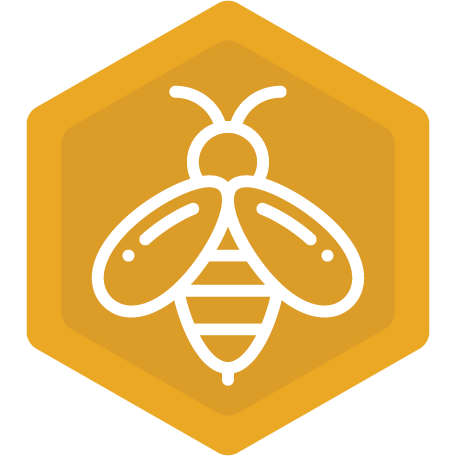
Download Info
July 1, 2020.

COMMENTS
Challenge for Student Writers. The 200 word student writing challenge takes a spin on a traditional writing prompt. Instead of asking students to respond to one question, it has an overarching theme. The theme is broken down into four sub, or smaller, questions. Students can respond with their answers to the questions using about 50 words each.
Design your own 200 Word Challenge and persuade a teacher why it should be used for the next challenge. Tone. Week 6. Describe a world with no colour. Creativity. Week 7. Pick a time in history. Imagine you have a time machine and go back there.
Here's how our contest works: every Friday, we send out a newsletter containing five creative writing prompts. Each week, the story ideas center around a different theme. Authors then have one week — until the following Friday — to submit a short story based on one of our prompts. A winner is picked each week to win $250 and is highlighted ...
Practical, Achievable Goals: Discover the power of small, daily actions with the simple commitment to write 200 words a day.; A Proven Process: Discover the exact process to develop and maintain a writing habit that will last a lifetime.; Simplicity and Impact: Learn how just a few minutes a day can help you consistently integrate writing into your life, no matter your schedule or list of ...
A BIG story can be far too convoluted to cut to a maximum goal of, say, 200 words, such as the word count for the wildly popular Golden Donut Short Story Contest. You've often heard me speak of police officers needing to avoid tunnel vision and that need is for a few reasons, safety being number one. Number two is to avoid missing any and all ...
Understanding Word Prompts for Writing. When it comes to writing, prompts are an excellent way to get your creative juices flowing. A writing prompt is a word, phrase, or sentence that serves as a starting point for your writing. It can be a tool to help you overcome writer's block or a way to challenge yourself to write something new and ...
The idea for the 200 Word Writing Challenge originates from @Xris32 on Twitter. Inspired by a set of 200 Word Challenges shared by Twitter via @Team_English1, I have produced a number of 200 Word Challenges in the style of writing task typical of the new AQA English Language Paper 2B. You can see a couple of the slides as examples.
200 word challenge, Non fiction, Transactional writing. Like(25) 3913 Downloads . Save. Download. 5 x Non-Fiction Challenges #87384 | 200 word challenge, Non fiction. ... Of Mice and Men Creative Writing #87060 | 200 word challenge, Descriptive and narrative, Key stage three. Like(2) 1568 Downloads . Save. Download. S3 Writing Exercises #86696 ...
These 200 Word challenges are designed to encourage narrative or descriptive writing in response to an image, with either three techniques or three vocabulary choices to include in their 200 words long response, produced in 30 minutes, with 10 minutes spent proofreading, editing and correcting. I hope that they are of use to you.
Write in a different genre. Give yourself a single-day challenge of writing in a genre you don't know that well. Try writing about an event from your life like in the style of crime fiction. 5. Imagine you're writing for your best friend. Keeping a particular audience in mind helps some writers draft their work.
Posted on by Beth. Lots of schools started doing 200-word challenges as a quick way to sharpen up GCSE students' writing skills. I've noticed, in working as a tutor, however, that not all students know why they're doing them. If that's you, read on - this is what they can help you achieve. They help remind you to use features in your ...
200 word challenge, GCSE, Transactional writing. Like(7) 1508 Downloads . Save. Download. 200 WC RWW #88450 | 200 word challenge. Like(4) 921 Downloads . Save. Download. 220 WC Booklet A Morton ... 200 word challenge, GCSE Literature, Play text. Like(1) 756 Downloads . Save. Download. A Christmas Carol 200 Word Challenges MLY #88375 |
200 Word Challenge Sheets. Subject: English. Age range: 14-16. Resource type: Worksheet/Activity. File previews. docx, 623.92 KB. A selection of 200 word challenge sheets for creative writing. Tes paid licence How can I reuse this?
200 Word Challenge - The Word Bank. Welcome to The Word Bank! Now accepting daily deposits (interest guaranteed!) UPDATE: WE'VE HIT 19.4 MILLION WORDS! Keep up the great work! Send us your stories and share your successes about how the #200WordsaDay Challenge is helping your writing. You may even get a mention on the podcast!
We decided, after Easter, to join the 200 Word Challenge revolution; we've not looked back. Every week, every student in KS3 has a Weekly Writing Challenge lesson. It has evolved a little over the weeks so that the ingredients we want students to include has moved more towards slow writing ingredients and we've just added a 5-a-Day ...
200 Word Challenge - Awaken English. Creative Writing, KS3. 200 Word Challenge. November 27, 2017by Jancke Dunn. Inspired by the lead up to UAE's National Day our KS3 students are creating some detailed description based on iconic landscapes and buildings which have become world renowned. 200 Word Challenge - National Day.
Here's what they're for…. Lots of schools started doing 200-word challenges as a quick way to sharpen up GCSE students' writing skills. I've noticed, in working as a tutor, however, that not all students know why they're doing them. If that's you, read on - this is what they can help you achieve. They help remind you to use….
A selection of descriptive writing 200 word challenges. TAGS. 200 word challenge. Author Info. melissawells2605 View Profile. Download Info. Views Info 2018 views. Likes 3. File Size 741.65 KB. File Type PPTX. Updated June 30, 2020. Downloads 1476. Download. Follow; Follow;
Creative Writing - 200 Word Challenge. Subject: English. Age range: 14-16. Resource type: Other. File previews. pptx, 2.74 MB. docx, 16.68 KB. A creative writing task based on Twitter's popular 200-word challenge. Tes paid licence How can I reuse this?
Presentation on theme: "Produce a piece of creative writing inspired by this image."— Presentation transcript: 1 Produce a piece of creative writing inspired by this image. The 200 Word Challenge Produce a piece of creative writing inspired by this image. Focus: sensory language Words and Ideas from: Exposure "merciless iced east winds" "misery of dawn" "flowing flakes" "snow ...
Of Mice and Men Creative Writing #87060. Download Like(2) Report an issue. Report ... 200 word challenge. Descriptive and narrative. Key stage three. Author Info. Woody214 View Profile. Download Info. Views Info 2529 views. Likes 2. File Size 446.53 KB. File Type DOCX. Updated June 30, 2020. Downloads
200 Word/Writing Challenges: KS3. Subject: English. Age range: 11-14. Resource type: Lesson (complete) Nicspa's Shop. 4.33 6 reviews. Last updated ... pptx, 8.29 MB pptx, 917.68 KB pptx, 1.65 MB pptx, 52.26 MB. 31 200 word challenges. Aimed at providing general knowledge and cultural capital. Tes paid licenceHow can I reuse this? Reviews ...
200 word challenge. GCSE. Transactional writing. Author Info. kat.12345 View Profile. Download Info. Views Info 1664 views. Likes 7. File Size 5.91 MB. File Type ZIP. Updated July 1, 2020. Downloads 1507. Download. Follow; Follow; we are proud members of the NCVO, the membership community for charities and voluntary organisations in England.